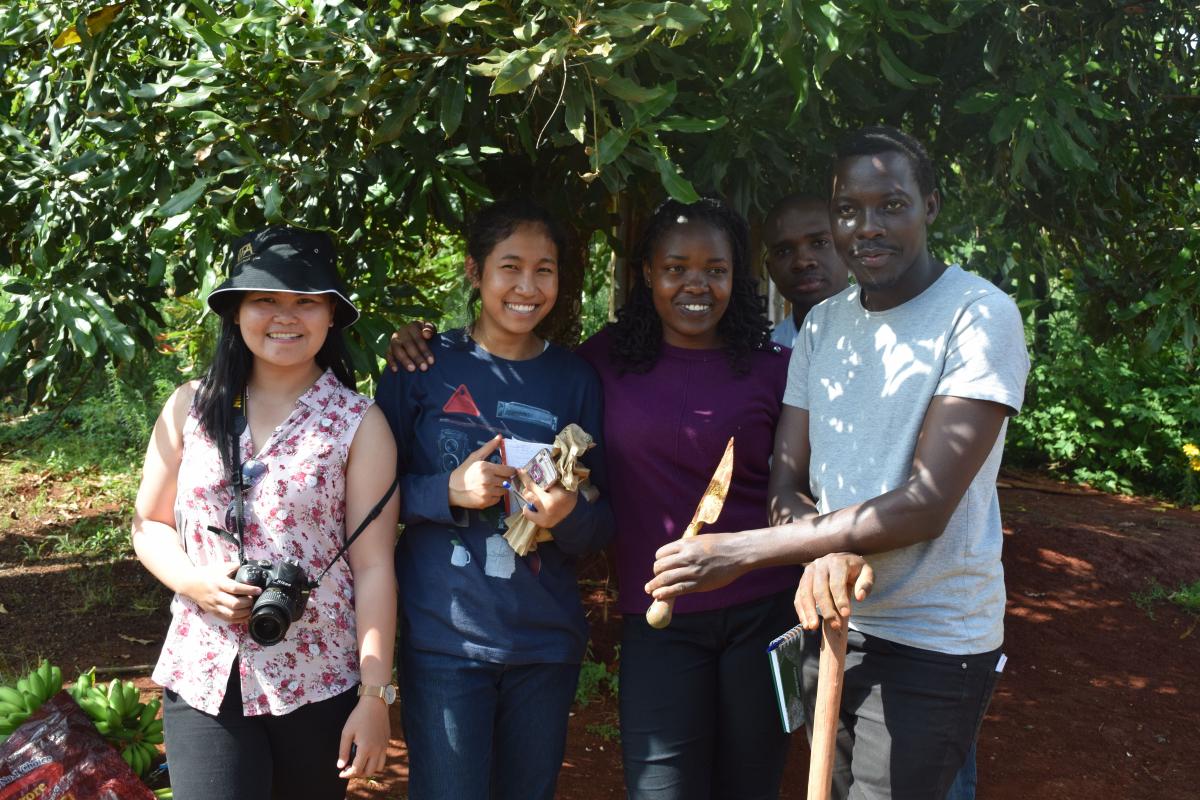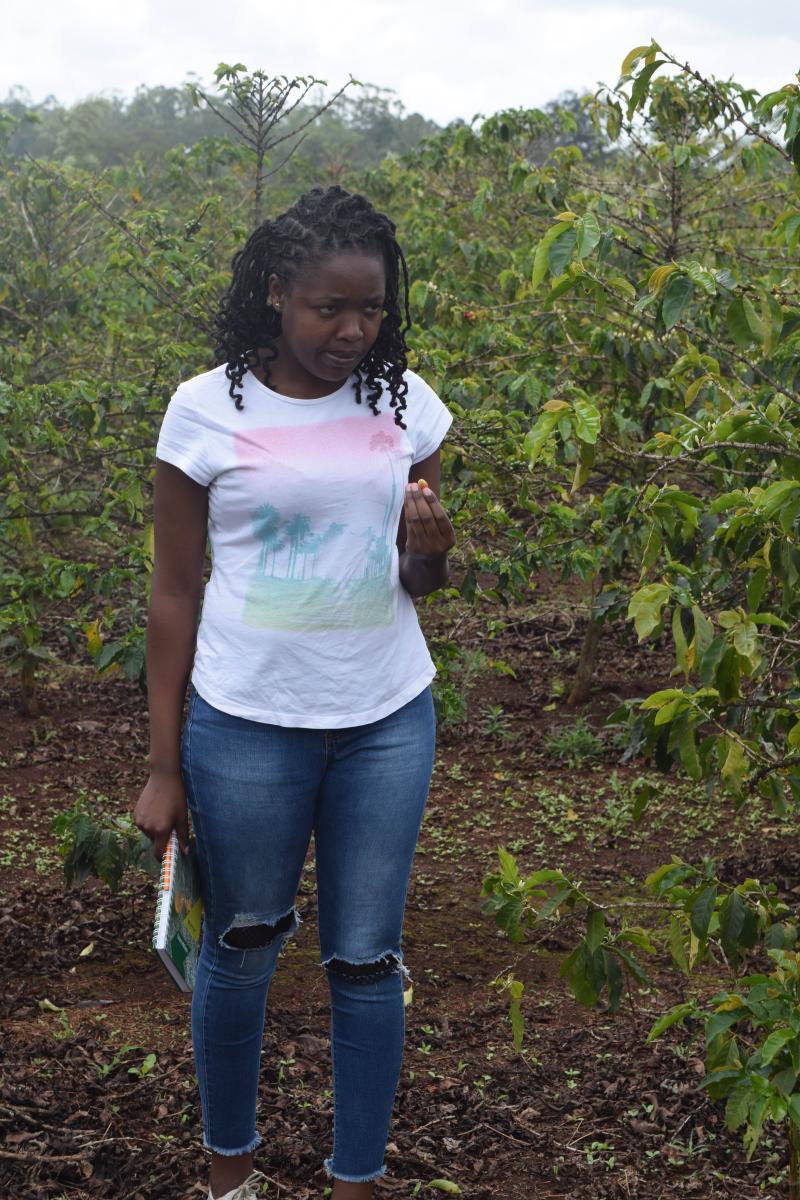Nematodes, science, agriculture and Africa
A CONVERSATION...
with students from the International MSc in Agro- & Environmental Nematology, Ghent University, Belgium, who were among the first cohort to undertake industrial training in Kenya in 2018, through a newly established partnership between the University, icipe and International Institute of Tropical Agriculture (IITA).
EXPEDITO OLIMI
Q: You recently completed three months industrial in Kenya. Exciting?
A. Yes, very. This training is the first of its kind so, in a way, my colleagues and I are pioneers. Also, one commonly hears of students leaving Africa and Asia to study in Europe. This opportunity turns the story around; students coming from Europe to Africa to learn. I am thrilled to be part of the journey.

Q. Take us to the beginning. Where does the journey start for you?
A. Back in the early 1990s. In western Uganda. Fort Portal. Small town. Polygamous family. Father passed on when I was just three years old. My mother was left to fend for three children, entirely dependent on agriculture. Needless to say, family resources were limited.
Q. And yet, seemingly, huge education dreams. Why?
A. Sheer audacity. As a young child I envied people who had gone far in school and aspired to be like them. Constraints abounded though. The only certainty was primary schooling because it was subsidised by the government. Secondary school seemed an unreachable dream for many, myself included. But I was fortunate. My stepfather, Mr Patrick Kusemererwa, became not only my guardian but a mentor who instilled in me the ethics and value of hard work. He was an army veteran and a teacher in the high school I attended and as such, I was challenged to work harder than everyone else. In my view, my stepfather gave me a future. When I sat my A levels in 2011, I obtained splendid results. But contrary to my mother’s great desire for me to study medicine, I yearned to become a scientist.
Q. A scientist? Why?
A. Seriously speaking? Because the option guaranteed one of the surest ways to earn university admission and possible consideration for government sponsorship. Yes, we had remarkable teachers in secondary school and I had gained a considerable grasp of basic sciences. But I did not have proper understanding of what it meant to be a scientist.
Q. How did you make a course choice?
A. One of my mentors, Dr Silvester Nyakaana, a reknowned Ugandan population geneticist, recommended what was then a new degree programme at Makerere University – biotechnology. I joined the inaugural class, albeit with no conception of the course or what it entailed.
This decision was life changing. An entirely new world opened up. The mystery of science started in earnest. I was enticed by the world of nucleic acids, genetic engineering, forensic sciences. Finally, I understood what it meant to be a scientist – to generate knowledge; to solve problems; the exciting opportunities that exist for peasant farming.
Q. Were the jobs forthcoming after graduation?
A. Oh no, the job market was a hard nut to crack. After graduating from university in 2015, I found myself in an environment where available positions required experience, thus locking out fresh graduates. I was lucky to eventually be recruited as a junior apprentice at the National Agricultural Research Organisation (NARO), Uganda, in the banana breeding programme. I was attached to a project focused on molecular screening for resistance against banana bacterial wilt on East Africa highland banana.
This opportunity enabled me to turn theory into practice. I clearly remember the first time I extracted DNA from samples: the techniques and attention required to ensure success. It was serious stuff. Inevitably, I made some errors in the beginning. However, I steadily became skillful to the point where I was given the responsibility of molecular characterisation of transgenic banana genotypes. Whenever I look back I see this as the place where my career in science truly started.
Q. How about the shift to nematology?
A. In 2016, the International Institute of Tropical Agriculture (IITA) soil science team consisting of Dr Danny Coyne and Dr Laura Cortada, probably having seen potential in me, offered me a position in a project that was promoting healthy seedlings for safer vegetables in East Africa. The activities included screening tomato cultivars preferred by farmers for bacterial wilt and nematodes, and promoting biological pesticides to control vegetable diseases. I also assisted in screening banana genotypes for nematode resistance. This project also exposed me to technology promotion and working with farmers at farm level.
My mind shifted.
Until then, I had viewed science from a very narrow perspective. Now, the view widened. Here is what I found fascinating: nematodes remain hidden to the general. But, as a scientist, using a microscope, arguably one of the most basic tools, I could scrutinise these pests vividly. Nematodes were no longer mere symptoms on plants, but a force to be reckoned with. I learnt about their immense impact on agriculture, and the complexity in tackling them. In addition, Dr Coyne and Dr Cortada encouraged and guided me, inspiring me to think beyond the horizon. As a result, I decided to apply for a scholarship at Ghent University to undertake an MSc in nematology, joining the course in September 2017.
Q. The industrial training in Kenya; your experience in summary?
I interned at Real IPM, a Kenya-based company that produces biological control agents. I was motivated to join a reputable company that is exploiting nature to control crop pests and diseases in an environmentally friendly manner.
Based on my nematology training, I anticipated hours of microscopy, extracting and identifying nematodes. I was wrong. Real IPM challenged me in a completely different way: I was charged with evaluating the performance of a fungus in the management of nematodes in cut roses. For my effort, I was rewarded with the joy of working with beauty (of the flowers) every day!
Q. Plans for the future?
A. I have learnt that science is indeed broad, and different aspects work in complementary ways. For example, there are synergies between molecular breeding and nematology. I want to build a complete scientific persona by increasing my knowledge in as many spheres of science as possible.
BETH WAWERU
Q. Where were you born and raised?
A. I was born and raised in Githunguri, an agricultural town in Kiambu county, just outside Nairobi, Kenya’s capital. The region is highly productive, dotted with small scale mixed farms consisting of cash, horticultural and staple crops, and dairy farming. While household incomes are not particularly high, most families live decent if simple lives – the sort of environment that inspires one to aim high. In my case, I was fortunate to have highly dedicated parents who assured my siblings and I that if we set our eyes on well considered goals, they would find a way to support us. I attended a well rated secondary school between 2006 and 2009,and obtained good grades that guaranteed university admission.

Q. How did you select what to study at university?
A. Based on the default system employed by Kenyan universities, I was accepted for a BSc in Environmental Conservation and Natural Resource Management, at the University of Nairobi, Kenya, starting from 2011.
Q: How did you shift to nematology?
A. It was really by chance. In 2015, I was looking for a topic for my final year research project, aiming to focus on a water body due to the potential of engaging with diverse flora and fauna. My supervisor, Prof. Agnes Muthumbi, suggested a case study of free living marine nematodes in Mida Creek Reserve, a lagoon at the Kenyan coast. As I had not studied nematodes before, Prof. Muthumbi very patiently gave me a crash course on how to process samples and identify the nematodes to genera level. It was a challenging endeavour. I remember at the start of the research project, being presented with myriad nematode samples to identify and feeling completely at a loss. But I learnt fast; I improvised an identification key, eventually identifying 1,500 genera of nematodes.
And then, in 2015, just after I had concluded my university studies, my father passed away. It was a huge loss for the entire family and one that I needed to distract myself from. As such, after graduation I sought work opportunities that would be far away from home and engrossing enough to allow the healing required for such a traumatic experience. In the process, with the help of Prof. Muthumbi, I secured an internship at the Kenya Marine and Fisheries Research Institute in Mombasa, coastal Kenya.
Q. Describe your experience.
I was assigned to work on benthic organisms within the mangrove ecosystem, phytoplankton and ocean acidification. It was interesting to collect samples in the field, analyse them in the laboratory and conduct trainings for local communities. I also found a supportive team of scientists who introduced me to seagrass and coral ecosystem research. I also attended conferences, seminars and trainings in and outside Kenya. My supervisor Dr Okuku challenged me to advance my studies, which led me to Ghent University. I decided to focus on entomopathogenic nematodes, based on my desire to contribute environmentally friendly solutions for crop pests and diseases.
Q. Why did you join the industrial training course in Kenya?
A. I found it to be a unique opportunity that I just couldn’t let pass by, for several reasons. First, icipe and IITA are two well-known and respected organisations, well worth affiliating with. Second, I foresaw a chance to connect the knowledge obtained during the MSc course to real life situations in Kenya. Third, to my knowledge, it is not always easy for students to secure internships in Kenya. In addition, students who study abroad have difficulties making career inroads once they return home. This training presented a chance to counter these challenges. I now have a network to tap into when I return home at the end of my studies.
Q. Describe your experience during your three months training in Kenya?
I was attached to Koppert Biological Systems, where I acquired practical skills, and overall strengthened my capacity for hard work and accountability. Moreover, the Kenya track course opened my eyes to the country’s agricultural sector. Through visits to small-holder as well as commercial farmers it became quite clear why this sector is touted as the ‘backbone’ of Kenya’s economy. I learnt about the many common tropical pests and diseases that affect our crops and available solutions. It was quite evident that, while nematodes are a serious problem, in general, there is limited nematological knowledge and capacity. The need for collaboration between nematologists and professionals working on other pests and diseases is also essential. Further, I greatly appreciated the chance to interact with farmers and a range of stakeholders in the Kenyan agricultural sector and to create awareness on the nematode challenge in the country.
Q. Plans for the future?
I grew up watching my parents and neighbours fight a losing battle with crop pests. I would like to be involved in working and learning with farmers, towards generating effective and sustainable solutions. I have a great desire to become an agripreneur.

